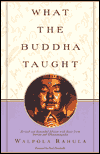Buddhism 101
Review by Paul Blairon, California Literary Review, Nov 15, 2004
Title: What The Buddha Taught
Author: Walpola Rahula
Publisher: Grove/Atlantic, Inc. 192 pp.
What The Buddha Taught accurately describes itself as a reliable introduction to Buddhism. As a religion with an unrivaled track record for living up to its ideals, Buddhism will certainly be tested as it is absorbed more and more by the West.
 From Zen cooking to Zen tennis to Richard Gere philosophizing on the Oprah Winfrey show, Buddhism is certainly a part of modern America?s zeitgeist. But I doubt there is a basic understanding of what Buddism is and what it is not, even among many of its proponents. Throughout the world there are currently over 200 distinct variations of Buddhism. Dr. Rahula returns to the earliest recorded teachings of the Buddha to provide us with a solid foundation into a fascinating religion.
From Zen cooking to Zen tennis to Richard Gere philosophizing on the Oprah Winfrey show, Buddhism is certainly a part of modern America?s zeitgeist. But I doubt there is a basic understanding of what Buddism is and what it is not, even among many of its proponents. Throughout the world there are currently over 200 distinct variations of Buddhism. Dr. Rahula returns to the earliest recorded teachings of the Buddha to provide us with a solid foundation into a fascinating religion.
To begin with, it might be difficult to even classify Buddhism as a religion. The Buddha was simply a human being and never claimed to be more than that. He was not the incarnation of God or a prophet of God. All of his insight he attributed to his own effort and intelligence. He believed that all doctrine should be questioned, even the Buddha?s. Buddhism is more of a path for the individual to travel, than a faith or belief.
The central tenants of Buddhism are the Four Noble Truths. The first is often translated as ?The Noble Truth of Suffering.? Dr. Rahula finds this a bad translation and prefers the Pali word dukkha instead of ?suffering.? Dukkha connotes not just suffering, but also ?impermanence?, ?emptiness?, and ?insubstantiality.? Happiness is a part of life, a part of dukkha, but like everything else it has no permanence.
The Second Noble Truth is the arising of dukkha ? man?s desire or craving. This ?thirst? or attachment is not only for wealth, power, and sense-pleasures, but can also manifest itself in attachment to ideas, opinions, theories and beliefs. This arises from an organism?s ?desire, the will to be, to exist, to re-exist, to become more and more.?
The Third Noble Truth is ?The Cessation of Dukkha? ? that if one eliminates the root cause of dukkha, which is thirst, there ensues a liberation or emancipation which is known as Nirvana. A description of this supramundane state of Nirvana is simply impossible. It is most frequently expressed in terms of what it is not ? thirst, craving, etc.
The Fourth Noble Truth is the way or path that leads to Nirvana. It rejects the two extremes of sense pleasure and asceticism to follow a Middle Path. The path can be categorized as follows:
Right Understanding
Right Thought
Right Speech
Right Action
Right Livelihood
Right Effort
Right Mindfulness
Right Concentration
The most radical concept found in Buddhism is the denial of a soul or distinct self. A spirit or consciousness that is separate from matter does not exist. It is the attachment to our own ego (me, mine, pride, conceit, etc.) that causes all of the world?s miseries. Man has created the concept of an immortal soul as a deluded means of self-preservation, and has created the notion of a loving God for his own protection in a dangerous world.
Meditation is an important aspect of Buddhism, but meditation for the purpose of spiritual power is considered a perversion. Meditation in Buddhism has two purposes. The first is to develop mental concentration. The second is to gain ?Insight? into the nature of things through ?mindfulness, awareness, vigilance and observation.?
The Buddha taught for 45 years - up until the day he died. He discussed the loftiest spiritual ideas as well as more mundane topics concerning everyday problems that one may encounter. Dr. Rahula?s book provides a terrific introduction to the Buddha?s teachings.
But let me see if I understand this ? excuse me, if ?I? understand this. There is no separate consciousness, no ?thinker of the thoughts.? The concept of free will is incompatible with a Buddhist worldview of complete interdependence. There are merely actions and reactions. All well and good, but it brings up a whole host of questions. If it?s all simply cause and effect, how can we ?know? anything? What distinguishes Buddhism from pure scientific materialism? Who or what is becoming aware? A re-read of Dr. Rahula?s book will probably help, but the search is on for a book that explains how Buddhism answers these kinds of questions.

 From Zen cooking to Zen tennis to Richard Gere philosophizing on the Oprah Winfrey show, Buddhism is certainly a part of modern America?s zeitgeist. But I doubt there is a basic understanding of what Buddism is and what it is not, even among many of its proponents. Throughout the world there are currently over 200 distinct variations of Buddhism. Dr. Rahula returns to the earliest recorded teachings of the Buddha to provide us with a solid foundation into a fascinating religion.
From Zen cooking to Zen tennis to Richard Gere philosophizing on the Oprah Winfrey show, Buddhism is certainly a part of modern America?s zeitgeist. But I doubt there is a basic understanding of what Buddism is and what it is not, even among many of its proponents. Throughout the world there are currently over 200 distinct variations of Buddhism. Dr. Rahula returns to the earliest recorded teachings of the Buddha to provide us with a solid foundation into a fascinating religion.